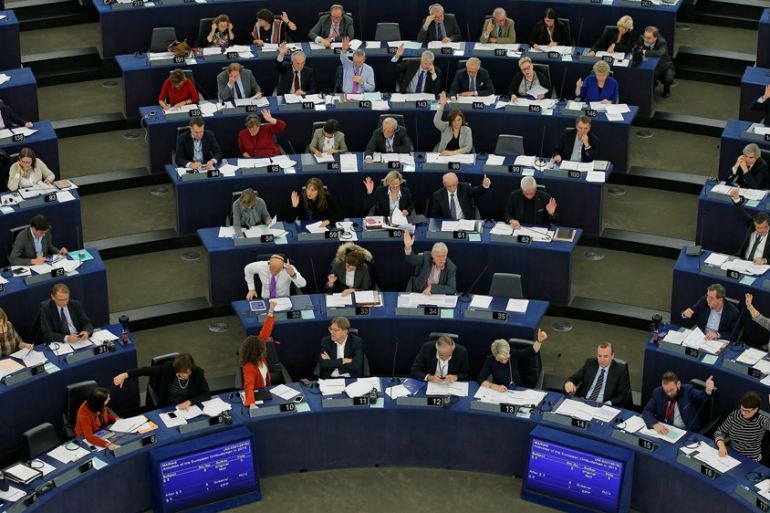Turkey dismisses EU Parliament vote to freeze talks
Ankara criticises vote that calls for a temporary halt to its EU membership talks over the response to failed coup bid.

Turkish Prime Minister Binali Yildirim has dismissed a European Parliament vote calling for a temporary freeze to Ankara’s membership talks with the European Union as “insignificant”.
Of the 623 politicians present for Thursday’s vote in France’s Strasbourg, 479 were in favour of a halt in negotiations over Turkey’s “disproportionate” crackdown following July’s failed coup attempt. Thirty seven abstained against and 107 abstained.
Keep reading
list of 4 itemsAre more European nations finally moving to recognise Palestine statehood?
EU lawmakers approve sweeping overhaul of asylum and migration rules
EU Parliament committee urges probe after Al Jazeera Senegal investigation
Yet, the vote is non-binding and EU governments are unlikely to take heed.
Shortly after, Yildirim said that the outcome had no value and urged EU leaders to speak out against what he termed a “lack of vision”.
“The EU should understand and decide whether it wants to shape its future vision with or without Turkey,” he was quoted by the AFP news agency as saying.
Mehmet Simsek, Turkey’s deputy prime minister, also criticised the decision, describing it on Twitter as “populist” and “counterproductive.
Meanwhile, Carl Bildt, a former prime minister of Sweden, said the vote showed a “populist short-term rather than strategic long-term approach to relations which Turkey”.
Obvious that many in European Parliament take a populist short-term rather than strategic long-term approach to relations which Turkey.
— Carl Bildt (@carlbildt) November 24, 2016
OPINION: Turkey is the sick – but still strong – man of Europe
The decision comes amid heightened tensions within Turkey in the aftermath of the coup bid on July 15. Since then, almost 37,000 suspects have been placed under arrest, and tens of thousands have lost their jobs.
Politicians voting in Strasbourg said the parliament “strongly condemns the disproportionate repressive measures taken in Turkey since the failed military coup attempt”.
Last week, top EU politicians cancelled a visit to Turkey after Ankara refused to see one member of European parliament because of her criticism of the government’s response to the coup attempt.
Ankara blames US-based Muslim cleric Fethullah Gulen, a former Erdogan ally who has been living in self-imposed exile in Pennsylvania, for the coup – a charge he denies.
Gulen’s movement, which President Recep Tayyip Erdogan refers to as a “terrorist” organisation, runs schools, charities and businesses internationally.
In comments published last weekend, Erdogan said Turkey should not be fixated on joining the EU and floated the idea of joining up with Russia and China in a Eurasian security group.
|
|